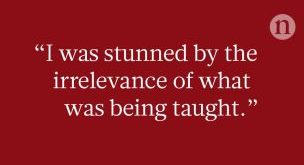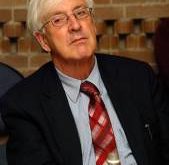from Lars Syll We certainly agree that regularities or models that explain or that give heuristic value over many different cases are highly desirable. But ones that do neither are not — especially if they use up huge resources along the way. When looking at the details, the Prisoner’s Dilemma’s explanatory record so far is poor and its heuristic record mixed at best. The only way to get a reliable sense of what theoretical input would actually be useful is via detailed empirical...
Read More »Internalizing “externalities”
from Victor Beker and RWER issue 106 There was a time when it was thought that the main task of economics was to assure economic growth. For example, John M. Keynes predicted that “the day is not far off when the Economic Problem will take the back seat where it belongs” (Keynes 1931: 6). Then, once scarcity has been overcome, mankind would devote most of its efforts to real problems, the problems of life and human relations (ibid,). The impact of economic growth on the Earth environment...
Read More »“I object to the question on which this volume focuses.”
from Richard Norgaard and RWER issue 106 I object to the question on which this volume focuses. It assumes that biophysical limits are real and knowable rather than a human construct associated with a particular understanding of how natural systems might behave. Limits have been an extremely useful construct for critiquing the even simpler construct that assumes science and technology can provide unlimited economic growth. Nature, however, has zillions of limits that are crossed all of...
Read More »Why economics is an impossible science
from Lars Syll In a word, Economics is an Impossible Science because by its own definition the determining conditions of the economy are not economic: they are “exogenous.” Supposedly a science of things, it is by definition without substance, being rather a mode of behavior: the application of scarce means to alternative ends so as to achieve the greatest possible satisfaction—neither means, ends, nor satisfaction substantially specified. Exogenous, however, is the culture, all those...
Read More »Introducing nonlinear and non-equilibrium perspectives into ecological economics
from Ping Chen and RWER issue 107 Economic Complexity vs. Neoclassical Simplicity Complexity science originated from astrophysics when Henri Poincaré discovered the three-body problem had no analytical solution in 1899. The discovery and development of deterministic chaos in the 1960s to 1990s found wide evidence that nonlinear deterministic systems only have limited predictability. Ilya Prigogine further recognized the important role of irreversibility in biological evolution since...
Read More »Do you want to subsidize rich people’s political contributions?
from Dean Baker In prior decades we in the US used to try to restrict the ability of the rich and very rich to buy elections. We have limits on campaign contributions to candidates and political parties. Until the Supreme Court’s 2009 decision in Citizens United case, corporations were prohibited altogether from contributing to politicians and political campaigns. This is no longer the case. The rich have found ways to largely circumvent campaign funding restrictions with independent...
Read More »Lessons from monetary history: The quality-quantity pendulum
from Asad Zaman and WEA Pedological Blog In the previous section, we saw how economic theories changed from classical to Keynesian to Monetarist over the course of the 20th century. These changes were driven by historical events. Taking this historical context into account deepens our understanding of economic theories. This contrasts with conventional methodology of economic textbooks, which treats economic theories as scientific laws, which are universally applicable to all societies....
Read More »“Complexity” in economics
from Maria Alejandra Madi and RWER issue 106 Anthropogenic climate change and ecological breakdown are now major threats to human life and other species. It is widely acknowledged that mainstream economic theory and especially neoclassical theory lack adequate concepts to address these problems and arguably have contributed to them through misdirection and delay. “Complexity” sciences, however, are now widely adopted but have as yet made little impact on economics. In this short article I...
Read More »Mainstream economics — an explanatory disaster
from Lars Syll To achieve explanatory success, a theory should, minimally, satisfy two criteria: it should have determinate implications for behavior, and the implied behavior should be what we actually observe. These are necessary conditions, not sufficient ones. Rational-choice theory often fails on both counts. The theory may be indeterminate, and people may be irrational. In what was perhaps the first sustained criticism of the theory, Keynes emphasized indeterminacy, notably because...
Read More »Weekend read – Neoliberal angst?
from Peter Radford I wonder why it is that neoliberals so reject the label we have given them. Is it because they’e embarrassed? I don’t think so. They all seem very proud of their attachment to the old order. Every so often one of them will surface and proclaim bitterly that they are misunderstood and they they don’t deserve the opprobrium piled on them by those nasty “leftists” who want to sully the pristine reputations of people like Mises and Hayek. Poor dears. Are we to feel...
Read More » Real-World Economics Review
Real-World Economics Review



